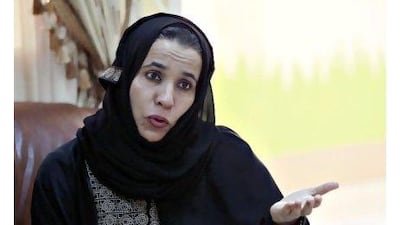ABU DHABI // A fortnight after the FNC elections some of the women who failed to win seats are still asking why, as in 2006, only one woman was elected.
Of the 85 female candidates, only Sheikha Eisa Ghanem from Umm Al Qaiwain won one of the 20 seats on September 24.
Madhheya Salem Al Menhali, who ran in Abu Dhabi, believes the low turnout hurt women's chances.
"Around 100,000 Emiratis did not come to cast their vote," Ms Al Menhali said.
In the run-up to the election, Dr Anwar Gargash, the Minister of State for FNC Affairs and head of the National Election Committee (NEC), repeatedly expressed his hope that the greater number of women eligible to vote would lead to more being elected.
That proved optimistic. Although the NEC has yet to release a breakdown of the figures by gender, it has been suggested the turnout among women may have been far lower than among men.
Overall, only 27.8 per cent of people entitled to vote did so. In Dubai and Abu Dhabi it was even lower, at 24.7 per cent and 21.3 per cent.
The emirate with the highest turnout, Umm Al Qaiwain with 54.7 per cent, was the only one to elect a woman.
Before polling day, hopes were raised that the women's cause would be boosted by the fact that they made up 46 per cent of the electorate, compared with 17.6 per cent in 2006.
Although Ms Al Menhali fell short, she believes she won enough votes to refute to any suggestion that voters preferred to be represented by men, or that women were not up to the job.
"If this was the case then I would have not got 709 votes," she said. "This shows people's trust in women, and there is no difference between men and women."
But Ms Al Menhali was 444 votes short of the fourth place that would have won her a seat. That went to Ahmed Mohamed Al Ameri, who gained 1,153 votes.
"I got a high number of votes and this is still an accomplishment," she said.
Ms Al Menhali said it was easier for men to campaign, as they could go into majlises and speak directly to male voters, while women were "more constrained".
"Reaching male voters was a little difficult," she said. "It was easier for men to reach others. We were restricted to holding meetings and not everyone would come. And we also have families to care for."
Ms Al Menhali expects the 20 members appointed by the emirates' rulers, due to be announced before the FNC's constitutionally mandated first sitting this week, will include many women, perhaps even more than the eight in 2006.
"Whatever the number is, it will definitely not be less than last time," she said.
Maryam Al Falasi, a Dubai candidate, was not surprised only one woman had won.
"It depends on each family and the background they are coming from," Ms Al Falasi said. "I think it's all about education. I think it will take a few times to get there."
She said a fuller picture would emerge when the appointments were made.
"Our leadership do support women, they are everywhere," Ms Al Falasi said. "It is a whole new experience. But we saw a good turnout, it will just take a matter of time."
Azza Sulaiman, who received 722 votes in Dubai, was disappointed women's groups had not done more to help female candidates.
During the campaign, the Dubai Women's Establishment hosted a talk by former female FNC members about their experiences.
"They should have done more to support women candidates than just this," Ms Sulaiman said.
She said there were also too many female candidates.
"Votes were scattered . There were 85 female candidates," she said.
"Some people should have pulled out. They took it as an experience only. They were not serious about becoming a member of the council and there were some people who were just looking for work."
Dr Gargash said before the campaign that the split women's vote had been one of the reasons for only one woman winning in 2006.
Ms Sulaiman and Ms Al Menhali have said they will run in the next elections, due in 2015.

